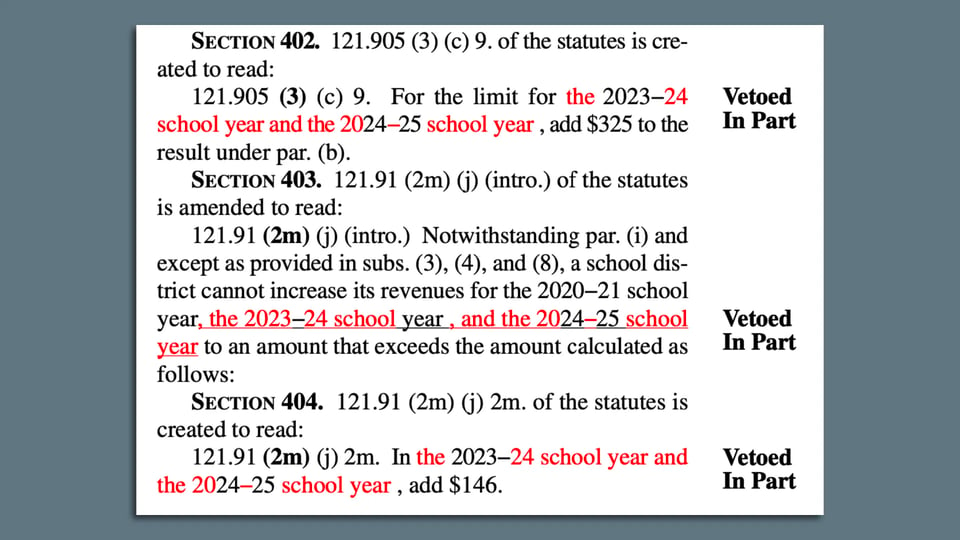A vacation smattering
I'm on vacation this week, so instead of a typically prosaic post I'm sending along a smattering of three interesting school finance things that happened over the last month:
Eversclear
Tony Evers, the governor of Wisconsin, did something badass in July. By using his atypically flexible line-item veto power, he increased Wisconsin's school funding exponentially by changing a dash and number in the budget. Rather than providing a $325 increase per student for two academic years, written in the budget as the 2023-24 and 2024-25 school years, he changed it to "the 2023-24 school year and the 2425 school year," enshrining the increase for more than 400 years.

The badass wonkery made international news, getting coverage basically everywhere and enraging the right to no end. It's amazing. You never see so much coverage of school finance budget esoterica. The reason for the sensation, I think, is that Evers did something that few Democrats do: use the rules to take a fighting stance for providing public resources. Some socialists might even call it "class struggle social democracy," though I'm not sure. Whatever you call it, instead the milquetoast moderate meekly trying to find some consensus with froth-mouthed conservatives and thus giving into their demands, Evers actually threw a big punch--in the school finance budget.
The person who does this the best is Bernie Sanders, though he's technically an Independent. But this fighting style has influenced a generation of Democrats, including the socialist Squad in congress, which has been growing exponentially; and John Fetterman does it with his political style, whose election delivered the Senate to the Democrats. More of this please!
Death of the money myth
The conservative think tank Fordham Institute published a report recently that created a stir among school finance quants. "Think Again: Is education funding in America still unequal" takes on the idea that school funding is unequal. The central claim is that state funding "more than compensates" for inequalities created by local property value.
All the number-crunchers got into a tizzy over this, as they usually do when something blatantly ideological sculpts numbers to advance a tendency that's at odds with their values. Read Zahava Stadler's good quant response to this in research terms. I'm less a quant and more a political economy guy I guess. It was obviously wrong to me, but I found the report exciting because of what this report admits: that money matters.
For a generation or more, the hegemonic thinking in economics of education was that money doesn't matter for schooling. We shouldn't give schools more money because we won't get the outcomes we need. Instead, schools should be held accountable with high stakes testing or be transformed into market entities that have to compete with one another for students. The argument was called "the money myth."
But with this report, we can see that the money myth is in fact a myth. Economists across the board, including the original gangster of this conservative strain of thinking, Eric Hanushek, have disproved it by demonstrating that, DUH, more money gets good outcomes. Not even the rightwingers can deny this anymore, which is pretty great. It's the end of an era and maybe, at least from the school finance angle, adds to the case that neoliberalism as such is breaking up.
Fuck Monsanto!
Back in Occupy Wall Street, one of the most common slogans you'd hear shouted during marches was "Fuck Monsanto!" The company stood for everything that was wrong with the world the movement wanted to change, particularly their use of poisonous chemicals in pesticides and patenting seeds so farmers can't use the seeds their plants produce for crop rotations, etc. But recently, some school districts have also taken on the corporation.
A group of Vermont school districts are suing Monsanto for using toxic PCBs to produce building materials. The PCBs can be found in everything from caulk to glue to glazes to lighting. Vermont law requires school districts to ensure that buildings are safe and estimates of how much it would cost to make the state's buildings safe from PCBs are, according to the plaintiffs, billions of dollars.
One high school even had to move out of its building and into an old department store because the facility had to be demolished.
So instead of spinning their wheels about increasing taxes or taking out expensive bonds on the municipal bond market, the state is suing the billion-dollar company who made the schools unsafe. It's a genius move and I really hope the case goes in their direction.